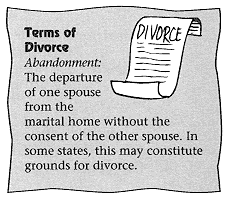|
|
|
|
|
|
|
Eric, for instance, had a close friend, Alex. They saw each other at school every day and often went over to each other's house after school. After Eric's parents announced their separation, he fought with Alex over everything. It seemed that Alex couldn't do anything right. Because Eric kept the news about his parents' divorce to himself, Alex didn't have a clue as to what was going wrong. Alex stopped seeing Eric. Eric lost a best friend at a time he needed one the most. |
|
|
|
|
|
|
|
|
To help your children work through this anger, make yourself available. Children need to know that their feelings count. Be all ears, and listen attentively when your children want to talk. Answer questions as honestly as you can according to the child's age. The more they can express their feelings, the easier the adjustment will be. |
|
|
|
|
|
|
|
|
What if, in the worst-case scenario, your spouse announces that he or she plans to abandon the family and have absolutely nothing to do with the children after the divorce? |
|
|
|
|
|
|
|
|
If possible, it behooves you to convince your partner that the children need him or her in their lives, no matter what. Communicating this urgent message to a spouse threatening abandonment may be your best weapon against the devastation of parental loss. Ironically, some parents abandon their children because they, themselves, lack self-esteem. They think their children would do better without them. If your spouse harbors such feelings, you must do your best to explain how crucial he or she is to your child's well-being. |
|
|
|
|
|
|
|
|
 |
|
|
|
|
|
|
|
|
What if, despite your urgings or completely to your surprise, your spouse actually just up and leaves? If this was a surprise to you, your own shock will make it monumentally more difficult to tell your children. You know, intuitively, that your children's self-esteem will be affected by your spouse's decision to cut them off. No matter how hard it is for you, it is far more damaging to your children because children don't have an adult's perspective on life or the inner resources to handle such extraordinary rejection and hurt. Your children might experience self-doubt, depression, and regression. |
|
|
|
|
|
|
|
|
It is your job to pick up the pieces. If you are the parent who has remained, you must be there with all your love and support, making sure your children |
|
|
|
|
|